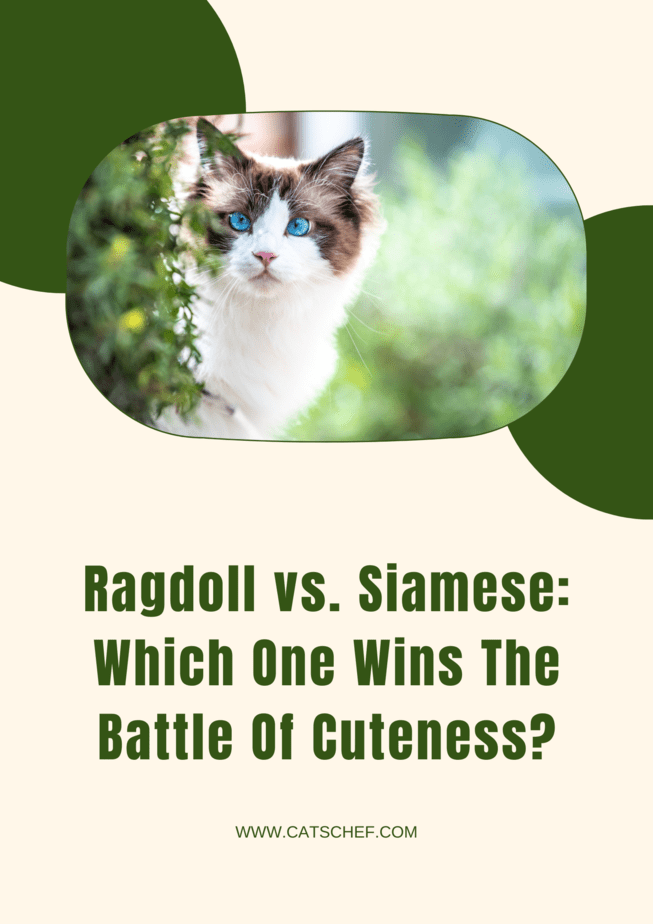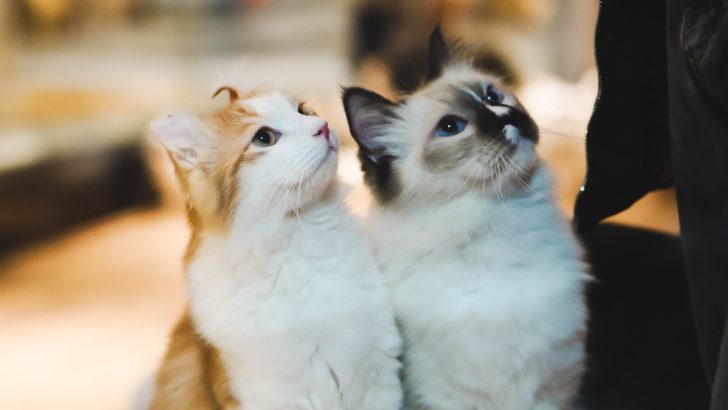Ragdoll vs. Siamese might not be the type of battle you thought you would ever search for (or watch). However, you’re getting tired of petting other people’s cats. And, you’re starting to wonder whether one of those beautiful breeds would be your purrfect pet.
Of course, there are pet parents aplenty that look for self-sufficient, standoffish mousers because they can’t bother with cuddling, snuggling, and whispering sweet nothings every moment of the day. But, you’re not one of those pet parents, are you?
Pet parents like you (and me) look for fluffers that won’t become annoyed when you try to hang out with them even when they’re sleeping on the sofa.
Or, when you try to follow them wherever they go because you can’t stand to spend a minute away from them. Or, when you snuggle them even when they’re clearly not feeling the mood.
Now, people tend to generalize cats and assume they’re all the same. Much like dogs, cats can have different purrsonalities, wants, and needs. For example, Bengal cats are famous for the fact that they’re physically active and adore running around, playing fetch, and causing trouble.
Scottish Fold cats, on the other hand, appreciate Sunday snuggles more than anything you could offer them. They’re calm and collected. They don’t mind lounging around the apartment without lifting a paw for the majority of the day. Depending on your preferences, you can find a breed that fits your needs to a tee.
Now that we have that out of the way, what’s the deal with the Ragdoll vs. Siamese battle? Which one’s more affectionate? Which one’s better for outdoor escapades? What sets them apart? Worry not, we’ve gathered everything you need to know about each breed before you make up your mind.
Ragdoll vs. Siamese: What’s the one thing that sets them apart?
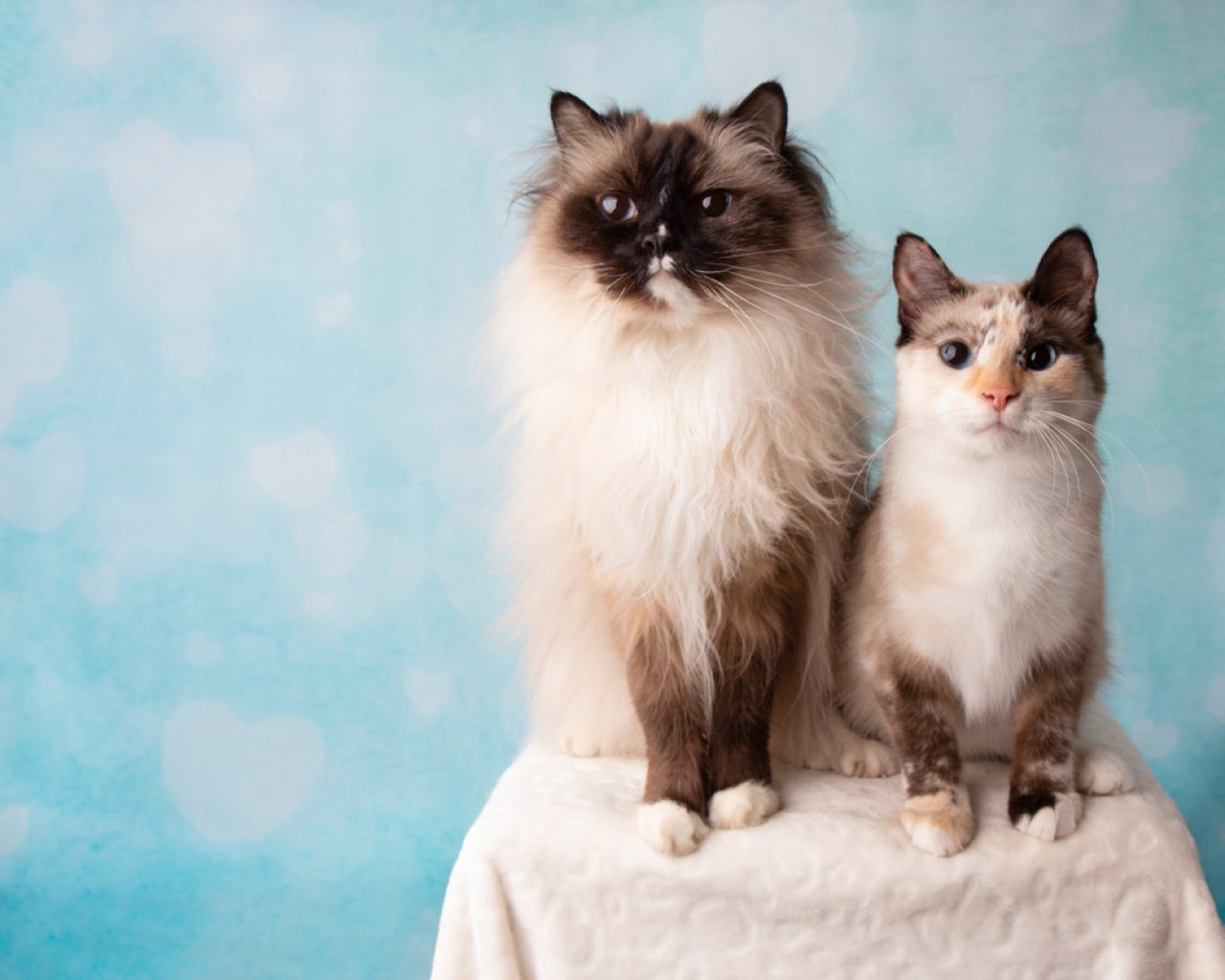
Ragdolls vs. Siamese cats sounds like a fight you never thought you needed. And, you don’t, because animal fights are disgusting and shouldn’t be a thing.
But, on a brighter note, there’s barely a chance you could choose between the two breeds when we’re talking about charm, cuteness, and beauteousness (and yes, that’s a word).
Contrary to some of the other breeds we’ve written about, these two aren’t mistaken for each other that often. As you might have expected, these beautiful beasts are soft, sweet, and floppy.
And, they couldn’t be further away from the attention-seeking Siamese cats – not that there’s anything wrong with that. On the other hand, Siamese cats are known to follow people around, demand cuddles, and get annoyed when they don’t get what they’re asking for.
Ragdolls are very, very self-sufficient and don’t mind being alone for long periods. Siamese cats, on the contrary, throw tantrums every time they’re bored. Oh and, they even become depressed when they’re home alone (a.k.a. when you leave them unattended for longer than 5 minutes).
Opposites attract, which means these two would become BFFs before you could even utter “I wasn’t planning on adopting two cats!”
Whatever the case might be, at least you wouldn’t confuse them for one another considering how different they are. Without further ado, here’s the scoop on each breed before you contact your local breeder (and get both!).
The rundown on the Ragdoll cat
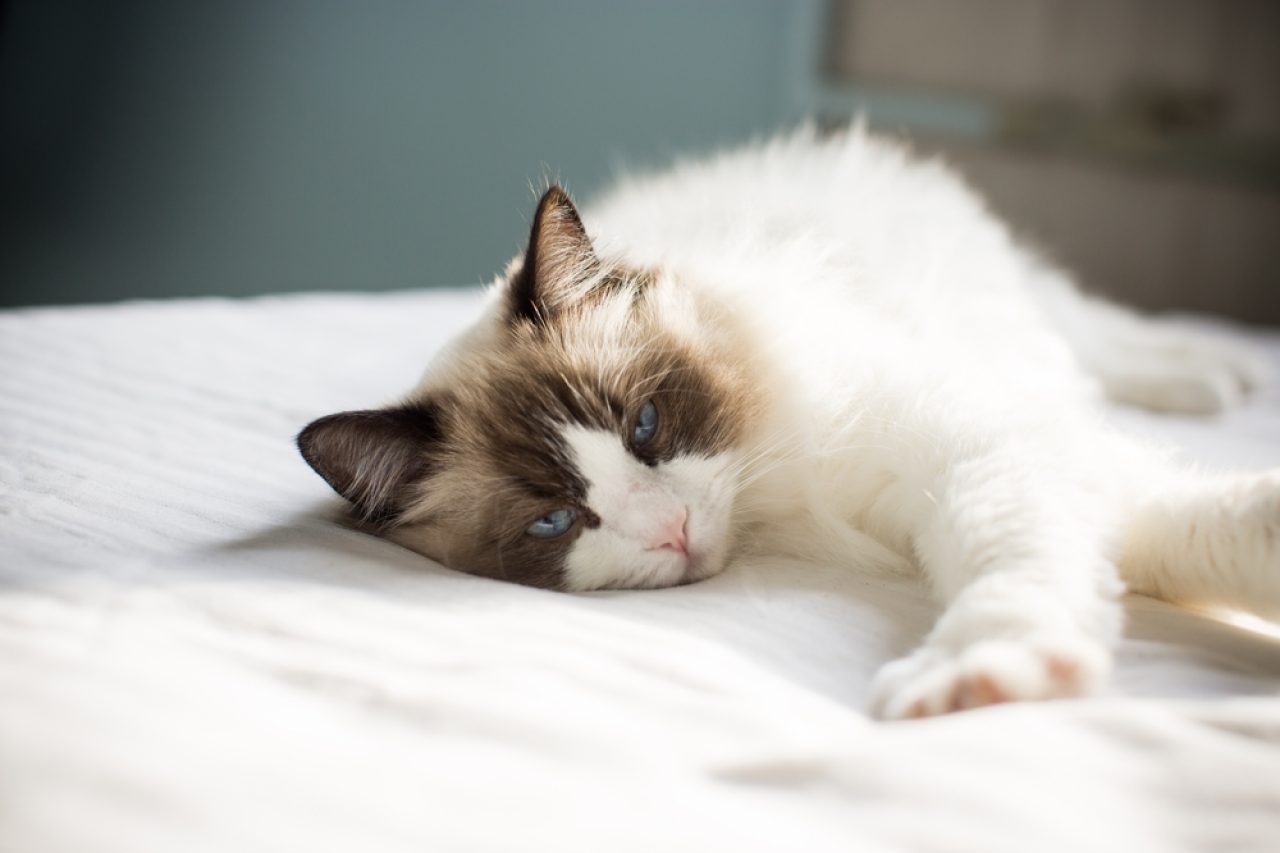
Now, your Ragdolls vs. Siamese search might not have answered every question you had right off the bat. But, we’re getting there.
Starting with Ragdolls, these fluffy felines are bound to make you love them as much as you love watching Gilmore Girls whenever you’re craving that autumn, October feeling.
Trust me, Ragdolls are the embodiment of everything snug, comfortable, and homey. Cuddling with one of these fluffers gives you the same feeling you get when you’re chillin’ with your favorite blanket wrapped around your shoulders and a Pumpkin Spice Latte on the way.
However, these adorable, affectionate creatures are going to cost you a lot more than your Starbucks coffee of choice. That’s right, you’re looking to count anything from $1,500 to $3,500 for a Ragdoll kitten from a reputable breeder.
Adoption agencies, on the other hand, go for anything from $100 to $400. But, you might have a hard time tracking down a Ragdoll kitten that way. Sure, there’s always the possibility that one of your acquaintances might have a Ragdoll kitten to spare. But, we wouldn’t bank on that.
However, every obstacle keeping you from getting your hands on one of these kittens becomes obsolete the moment those ocean eyes meet yours. And, that’s why you should take a look at what we’ve gathered. Quick, before one of those Ragdoll kittens starts meowing and purring to get your attention!
1. Physical appearance
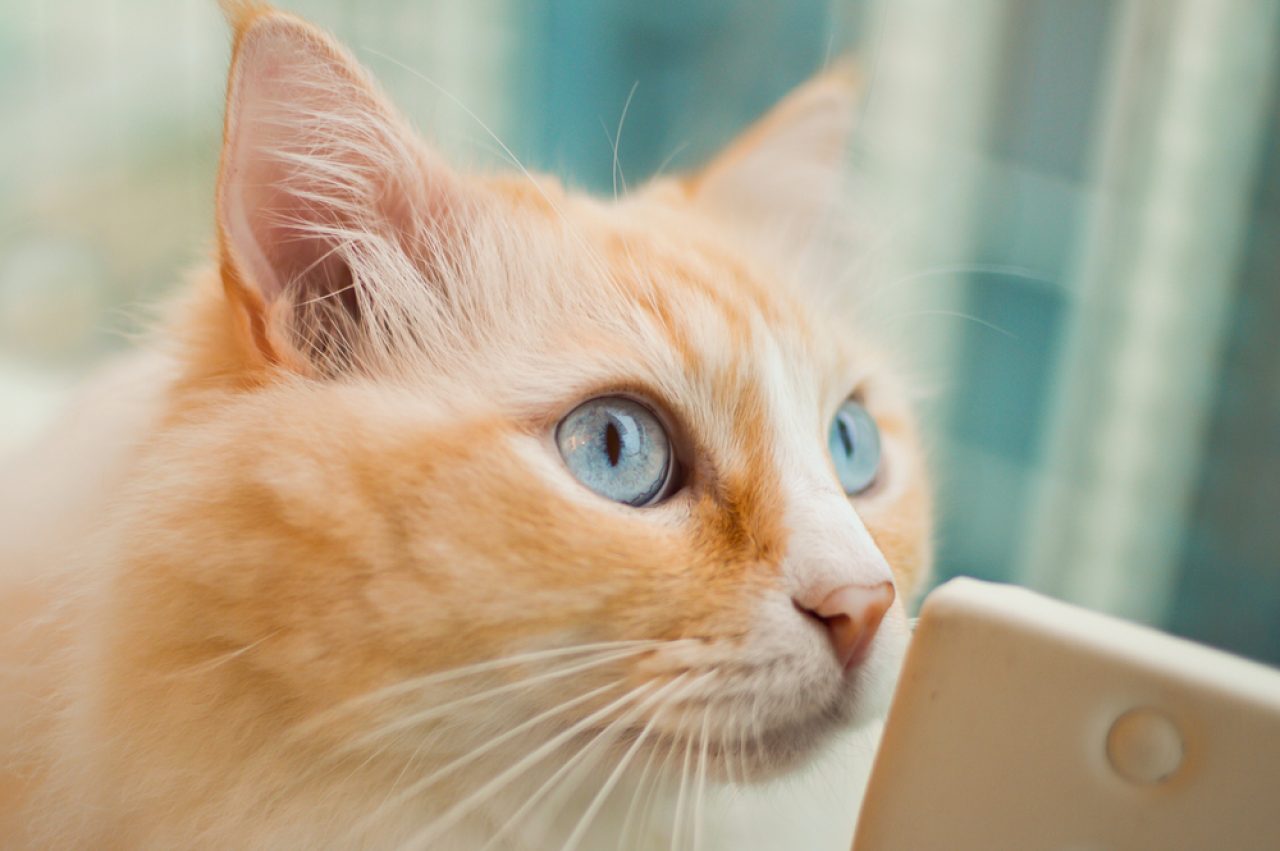
While we’re on the whole Ragdoll vs. Siamese thing, Ragdolls definitely take the cake when we’re talking about the size.
They’re large. They’re hefty. And, they don’t care whether or not you’re supposed to comment on a lady’s weight.
According to the Cat Fanciers’ Association, they’re typically 9 to 11 inches tall and 17 to 21 long. That’s without the lengthy, fluffy tails. They weigh anywhere between 10 to 20 pounds depending on whether we’re referring to male or female Ragdolls. Males are bigger and heavier, for the most part.
But, that’s not the first thing pet parents notice when they cross paths with a Ragdoll cat. They have the softest, smoothest of coats that can assume an array of color combinations and patterns (unlike Siamese cats, not to toot the Ragdoll’s horn).
They can be black, white, gray, blue, cream, lilac, chocolate, seal, and red. And, they can have colorpoint, bicolor, mitted, lynx point, and tortie point patterns. Though that might sound strange, you won’t easily find a fluffer with that many coats to choose from. Ragdolls are true fashionistas!
2. Purrsonality
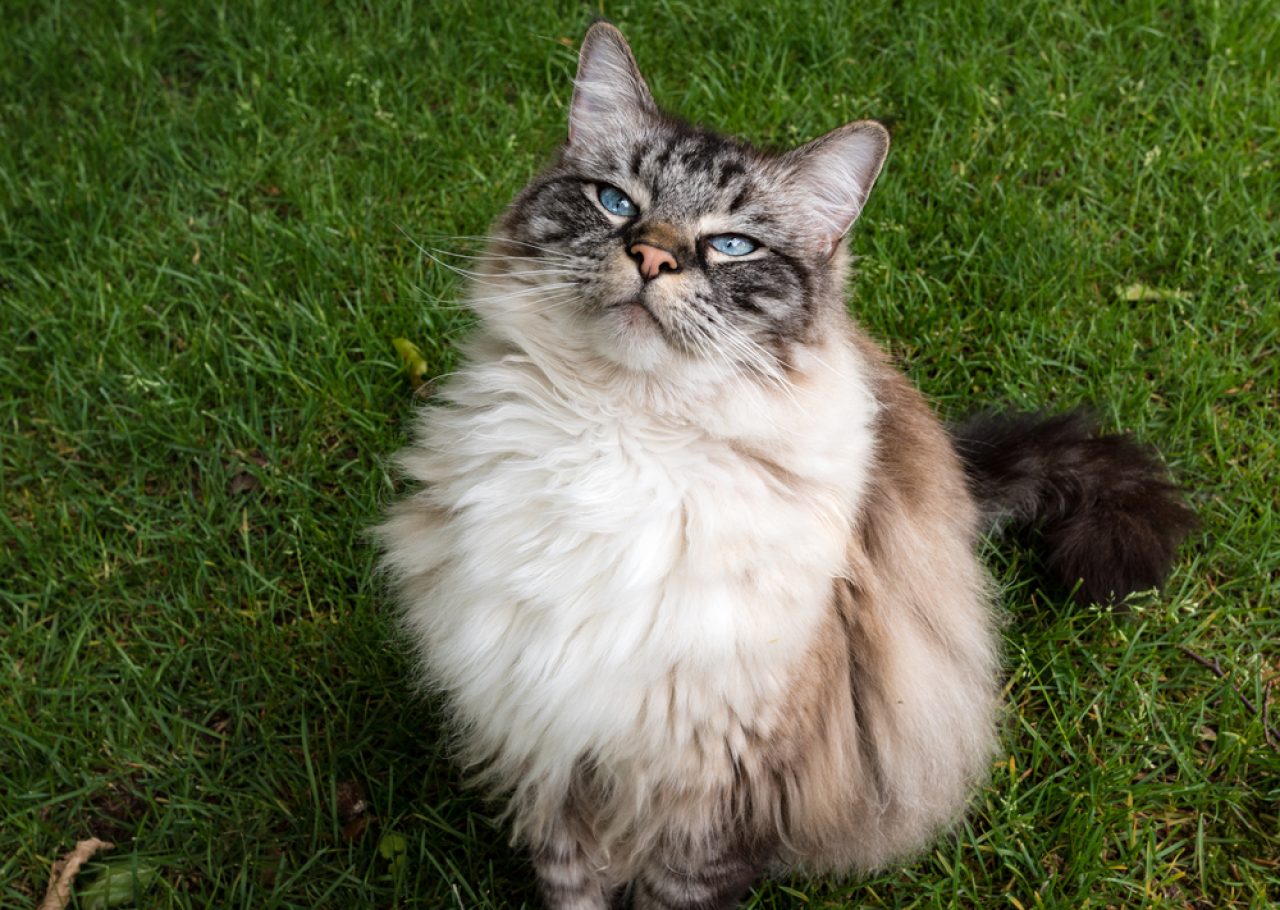
Here’s the thing, as a cat connoisseur (or a pet parent looking to adopt another cat), you’ve probably seen your share of cats that become completely floppy and soft the moment you start petting them.
Cats flop for a million different reasons. But, Ragdoll cats flop for one – because that’s the type of cat they are. As a matter of fact, that’s how they earned the name Ragdoll. When you pick them up or cuddle them, they go completely limp.
Therefore, some smartypants decided they looked like ragdolls and named them accordingly. Whatever the name might suggest, they adore acting like little children, babbling and purring for as long as somebody listens.
Obviously, we can’t forget that they’re super smart (even though they sometimes seem like they can’t walk on their own). Oh, you can teach them to do pretty much anything you think of. They can walk on a leash, play fetch (when they’re motivated to move a paw), and do a bunch of tricks.
Ragdolls are pretty great, as you might have guessed. Floppy or not, they’re a great choice for families because they’re fond of people.
For once, they crave attention and affection which they can get when they’re surrounded by people. But, they’re true-hearted and trustworthy which makes them magnificent companion cats.
3. Health
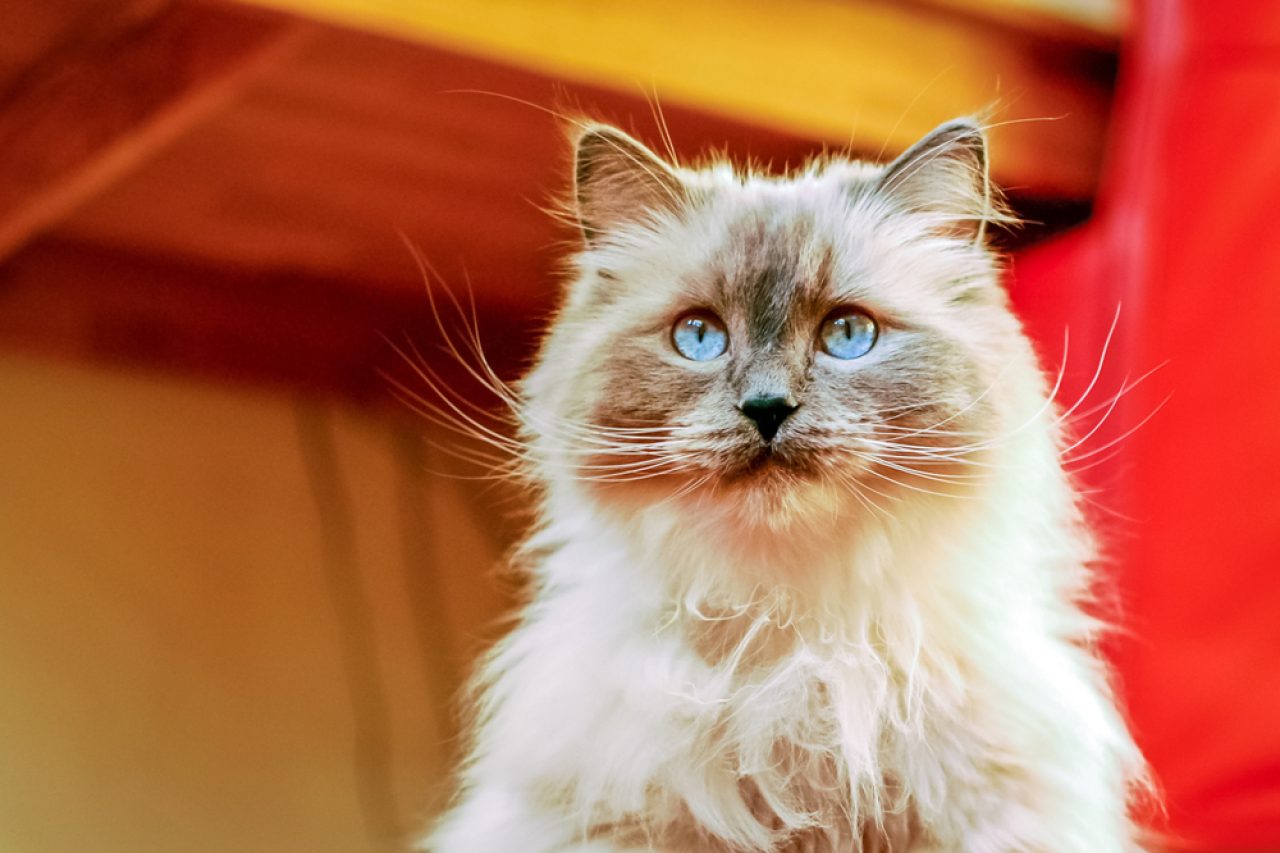
As a matter of course, there can’t be a Ragdoll vs. Siamese battle without the proper, mandatory health check! And, we’re happy to let you know that Ragdolls are a generally healthy breed. As healthy as they can be depending on nutrition, physical activity, environment, genetics, and a bunch of other factors.
Other than that, your Ragdoll kitten can live a happy and healthy life for as long as 13 to 18 years. Now, cats (like dogs) have a couple of health niggles to keep an eye on and check now and then.
We’re talking about diseases such as hypertrophic cardiomyopathy (HCM), kidney disease, urinary tract problems, and dental problems. Ragdolls are a hefty breed which means they might even experience problems with their joints (such as arthritis).
As one would expect, these problems can be controlled as long as you pay attention to your cat’s nutritional needs, physical activity levels, and regular veterinarian checkups. Actually, these checkups are a must when especially you’re thinking of becoming a pet parent to a purebred cat.
Most reputable breeders do check for health problems while they’re taking care of the kittens. But, you need to screen them regularly when they grow up. HCM and other health problems often go unnoticed (and untreated) for a long time.
4. History
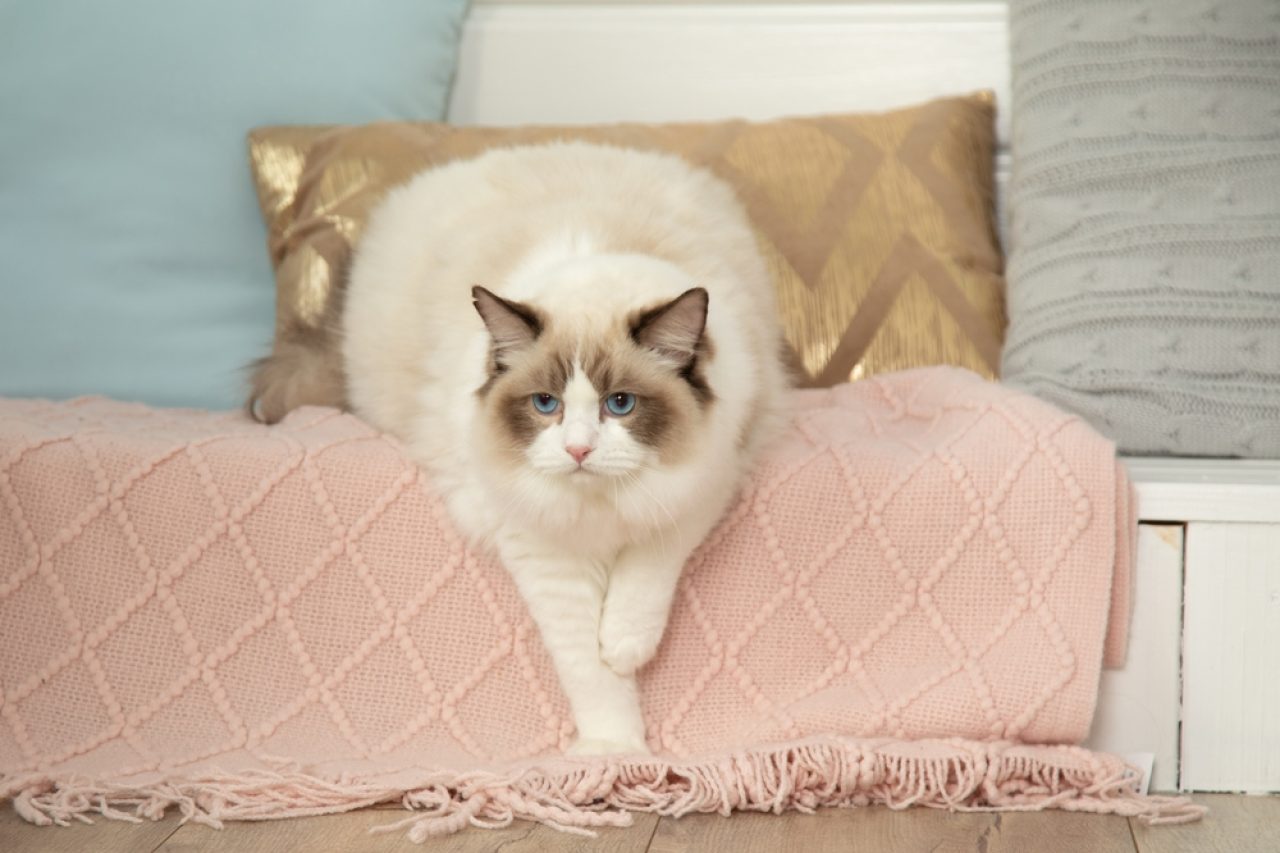
And now for the back story! Ann Baker, a Californian breeder, was the first to start working on a gentle, non-aggressive breed that was supposed to be perfect for a family. She managed to combine different breeds before she settled on one that was exactly what she was looking for – the Ragdoll.
However, she burned a lot of bridges while she was working on her Ragdoll formula. She became pretty eccentric with her comments about the breed.
She went as far as to argue how the breed came to be a result of medically altered genetics. Over time, more and more breeders decided to leave her side and go their separate ways.
Whatever happened between them didn’t hurt the breed that much, though. Both Ann and her fellow breeders continued creating different versions of Ragdoll cats. Ann’s Ragdolls became recognized as purebred sometime around 1965 and they’ve been taking the world by storm ever since.
Even Taylor Swift got herself one and named her Benjamin Button. Come on, a fluffer that’s good enough for a Grammy-winning artist (eleven times!) should be good enough for you. And, now that we’ve learned what makes Ragdolls addicting, we can move on to Siamese cats.
The mystery behind the Siamese cat
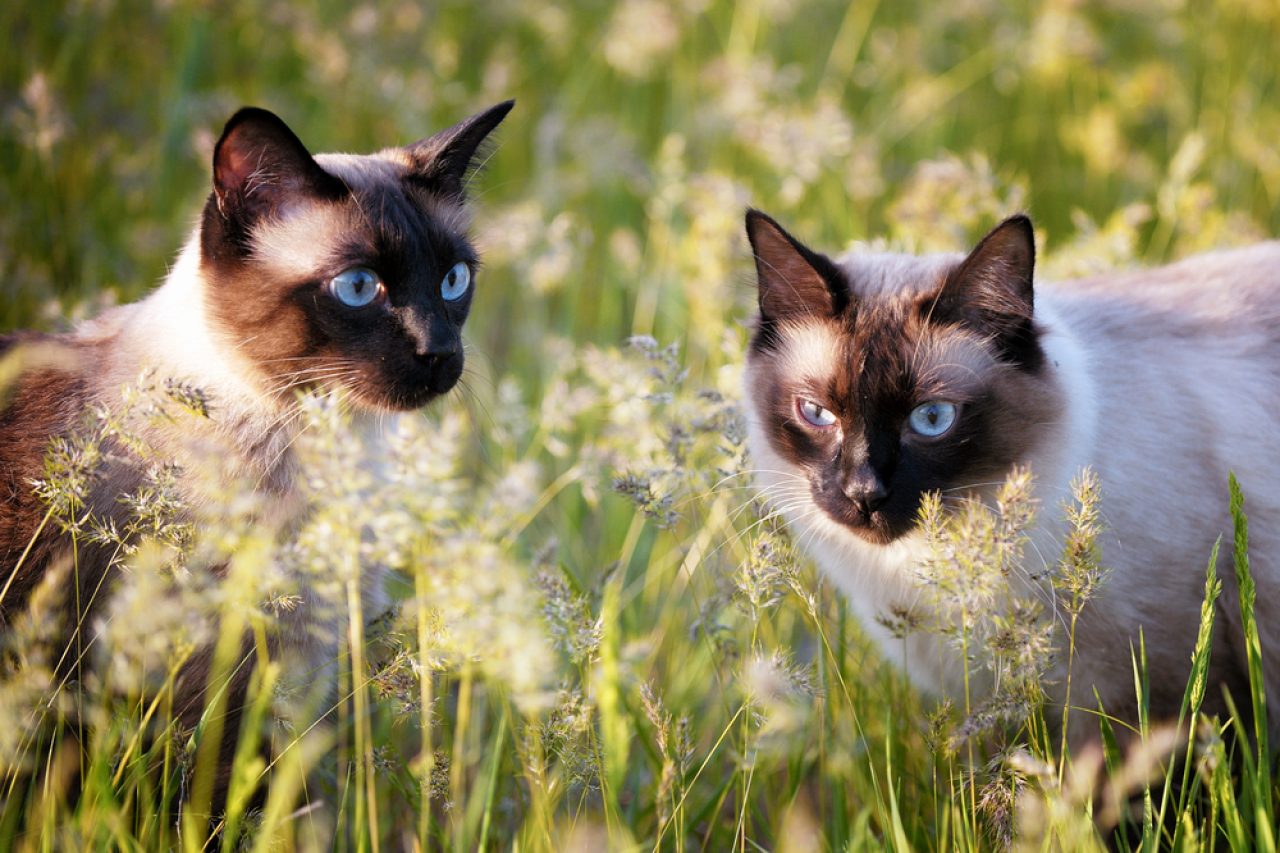
We’re not saying that learning everything about each of these breeds might help you choose, to be completely honest. But, researching the essence of what makes them better for you can help you figure out which one to get based on something other than “this one’s got blue eyes.”
While you’re already aware of how awesome Siamese cats are, there’s always something to add (to decide on the outcome of the Ragdoll vs. Siamese battle, of course). And, turns out nobody’s winning when we’re talking money because Siamese cats are as expensive as Ragdolls.
We’re hoping you’ve been generous with your piggybanks because you might need to count as much as $2,800 for a Siamese cat from a reputable breeder. We won’t go on a rant about how adoption agencies and rescue shelters might be a better choice for those of you who don’t have deep pockets.
But, a Siamese kitten from an adoption agency might cost you anywhere between $100 and $400. Now, Siamese cats might be one of the most popular breeds out there. However, you might have a tough time trying to get your hands on one through an adoption agency (something to keep an eye on).
Or, maybe you’re even able to get them for free from a relative or a friend who has a litter (highly unlikely, though). Whatever path you decide to take, here’s what you need to know about Siamese cats to understand that hefty price tag on their collars.
1. Physical appearance
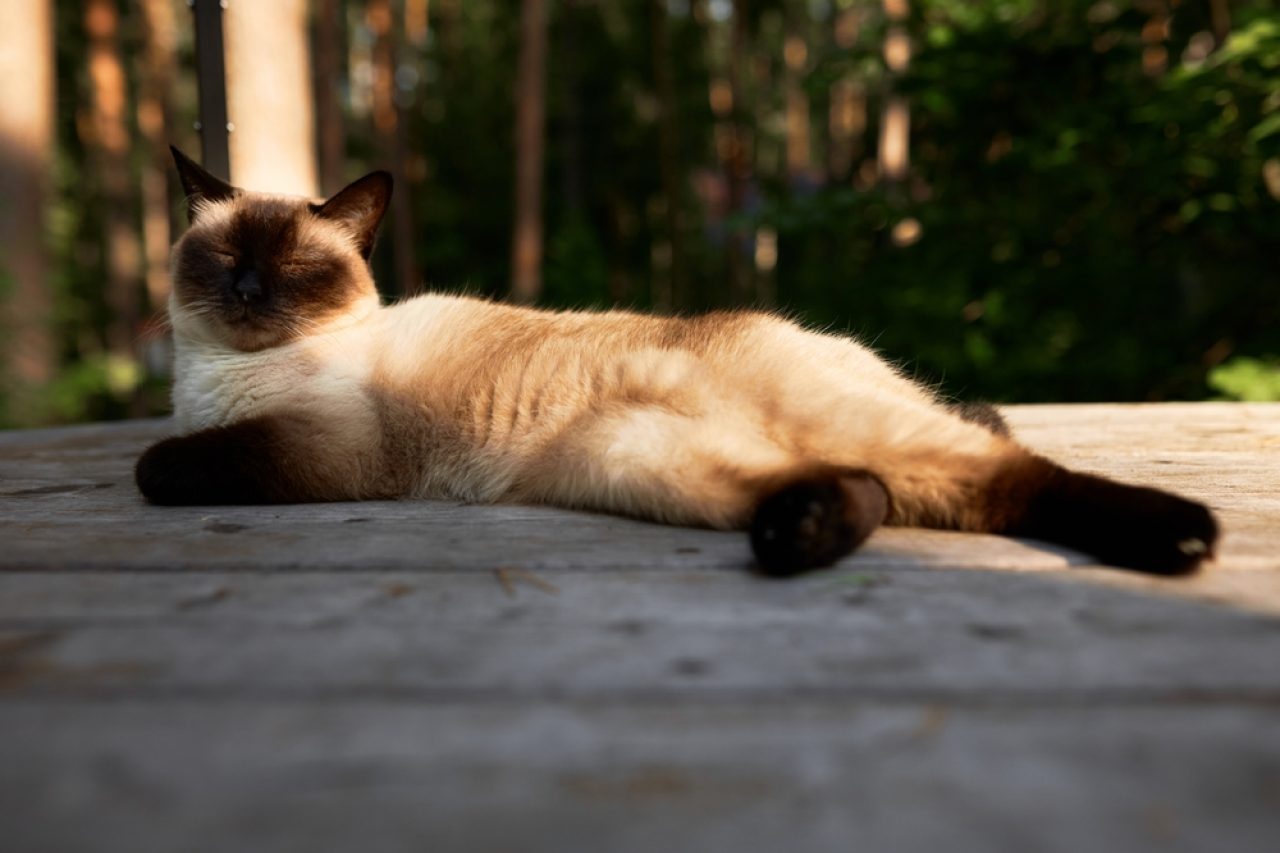
Oh, Siamese cats are known as “royalty kitties” for a reason! With a long and lengthy frame and ocean-blue eyes, these bad boys account for everything you’ve ever heard about them.
They might be compared to dogs more times than they would appreciate. They certainly don’t possess any canine characteristics when we’re talking bout appearance.
First things first, when we think of Siamese cats we almost always picture them with a high-contrast, color-point pattern (lighter bodies and darker faces, ears, legs, and tails).
Oftentimes, people describe them as mysterious. And, they are considering that Siamese colors aren’t determined by genetics (only). Siamese cats can be chocolate, brown, sable, cinnamon, lavender, silver, fawn, blue, gray, black, ebony, cream, beige, tan, lilac, and white.
But, they can only ever be the pattern that’s lighter everywhere other than the specific points. That’s because Siamese cats are actually albino, depending on the temperature. Other than that, Siamese cats always have those blue eyes that add to the list of things that make them attractive.
And, because of the short, soft coats (they’re not hypoallergenic), they appear even more luxurious and expensive (they are expensive, though). Argh, they’re so beautiful you might be tempted to get one of each color!
2. Purrsonality
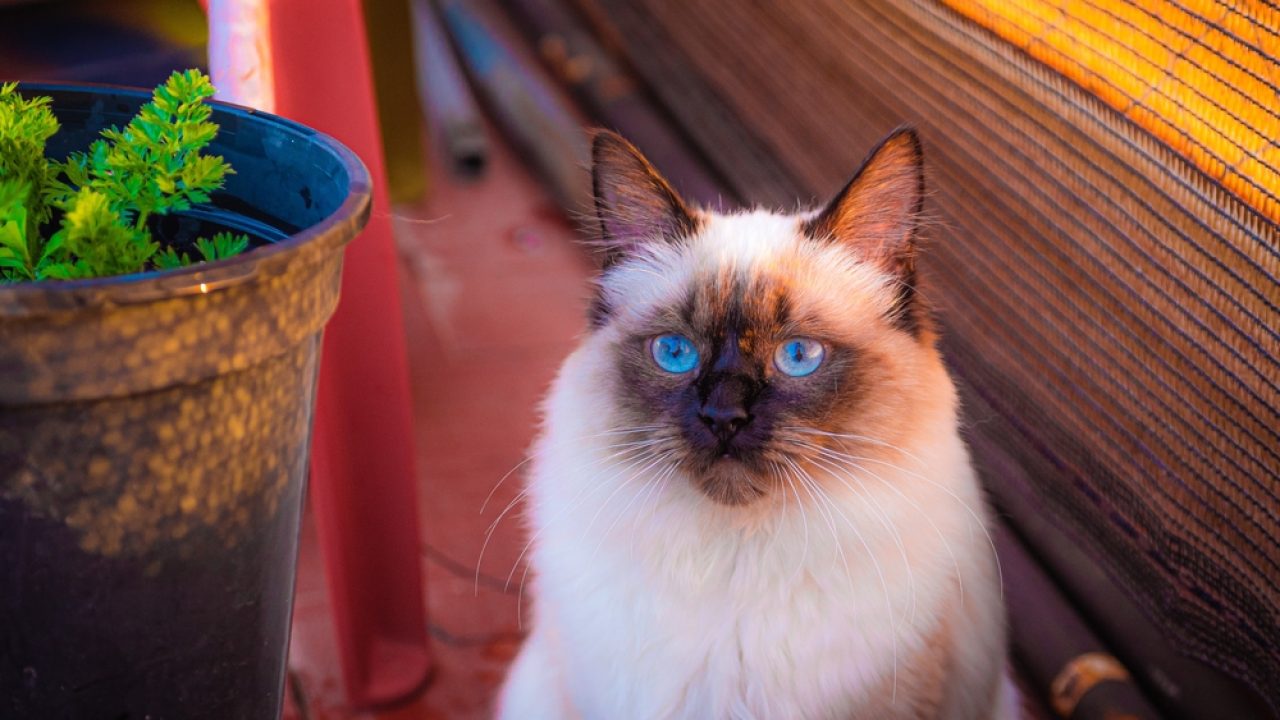
Now, we have to come clean and say that there are rumors suggesting Siamese cats might be mean. But, those rumors stem from the fact that Siamese cats don’t have your regular “cuddle me and never let me go” type of purrsonality.
When referring to the Ragdoll vs. Siamese battle, Siamese cats would definitely be deemed the more pleasant ones. Come on, people named them velcro kitties for a reason (they seem to have many, many nicknames).
We can’t argue that Siamese cats are some of the more warm-hearted and affectionate felines out there. We’re talking about the fact that they might follow you everywhere you go, sleep on your chest, and even stare at you while you’re going about your business.
Sure, they might appear standoffish. But, they’re probably plotting how to trick you and sleep with you on your bed, under the covers, while holding onto your arm. And, granted that you end up with a Siamese cat, you would have to be thoughtful of your actions (and words).
Oh, Siamese cats are sensitive. We have to whip out the italics to make sure you understand how sensitive they are. Other than that, these royal-looking moggies might meow your ears off. They love humans so much that they can’t dare spend a moment apart from them.
Therefore, they might hang out a couple of feet away from you and meow every now and then to make sure you’re paying attention to what they’re doing.
3. Health
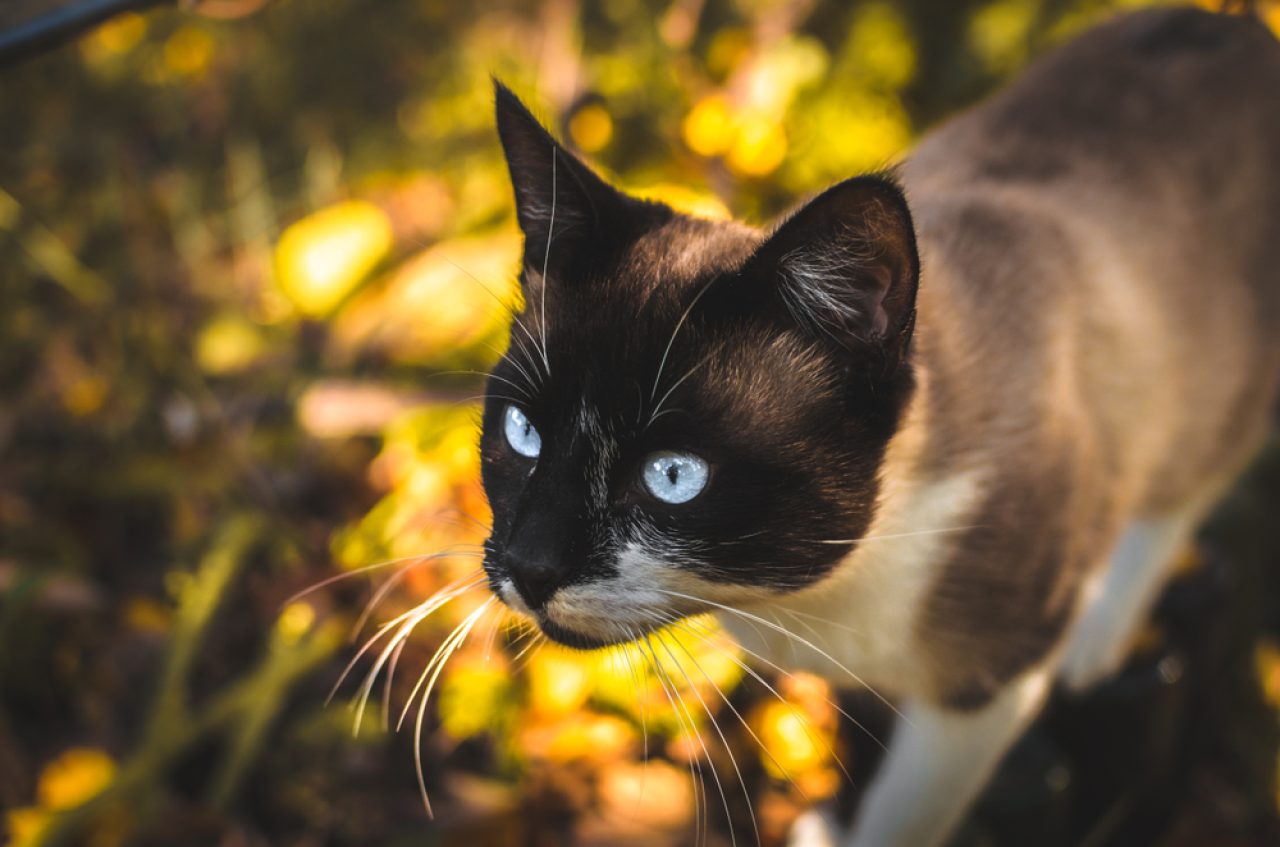
With the Ragdoll vs. Siamese battle on our minds, we can’t seem to find that many differences between the two breeds (at least healthwise).
Siamese cats are healthy as long as they’re taken care of. Proper nutrition, physical activity, affection, and genetics can ensure that the breed lives for as long as 15 to 20 years (a huge green flag).
But, that’s not to say that they don’t have a couple of health problems that might appear down the line. Amyloidosis (disease of the liver), asthma, teeth problems, and several kinds of cancer are what Siamese cats (might) deal with during that long life we mentioned beforehand.
On the other hand, you don’t have to freak out over most of these problems as long as you make sure your Siamese gets everything she needs.
And, given that you’re concerned about the prospects of getting a kitten that’s already affected by one of these diseases, you can always rely on the screening that most reputable breeders do. As you would expect, regular veterinarian checkups are a must (as long as you’re responsible for your cat’s health).
4. History
We weren’t kidding when we mentioned how Siamese cats were feline royalty! Turns out these mischievous monsters are one of the oldest existing Asian breeds (courtesy of the National Siamese Cat Club).
Siamese cats first appeared in the ancient lands of Siam (nowadays Thailand). According to The International Cat Association (TICA), there are manuscript mentions of Siamese cats dating as early as the 1350s.
And, needless to say, that’s how they ended up with the name Siamese (not that we’re complaining). Cat connoisseurs and breeders brought Siamese cats to England around the 19th century. They marketed them as “royal cats of Siam” and made sure they were available to the upper class (only).
They didn’t take too much time and they managed to wow the world with the beauty and the wits of these remarkable creatures.
Soon after, the Siamese became one of the most popular breeds worldwide. Even President Jimmy Carter’s daughter, Amy Lynn Carter, had a Siamese named Misty. Misty lived in the White House during Carter’s presidency. We should’ve voted for her!
Ragdoll vs. Siamese: Which one wins the battle of cuteness?

Ragdolls and Siamese cats might be worlds apart when we’re talking about appearance. But, one thing’s for sure – they’re equally adorable, affectionate, and warm-hearted.
Whichever of these knockout kitties you decide to rescue, adopt, or purchase, you’re sure to have a BFF by the end of the day.
What are you waiting for, then? Muster up the courage to contact one of your local breeders (or an adoption agency, or a friend who happens to have a litter of Ragdoll/Siamese kitties).
Maybe you even get a two-for-one deal on the off chance that you decide to go for both. Whatever you decide, good luck!
Read this: Ragamese Cat: What To Expect From A Ragdoll Siamese Mix?
